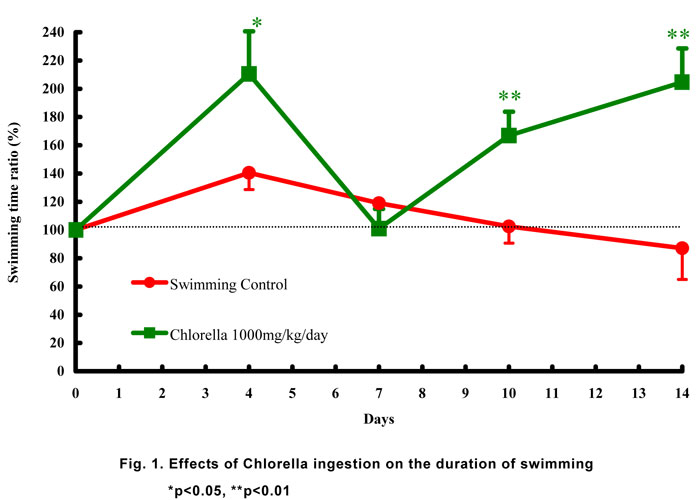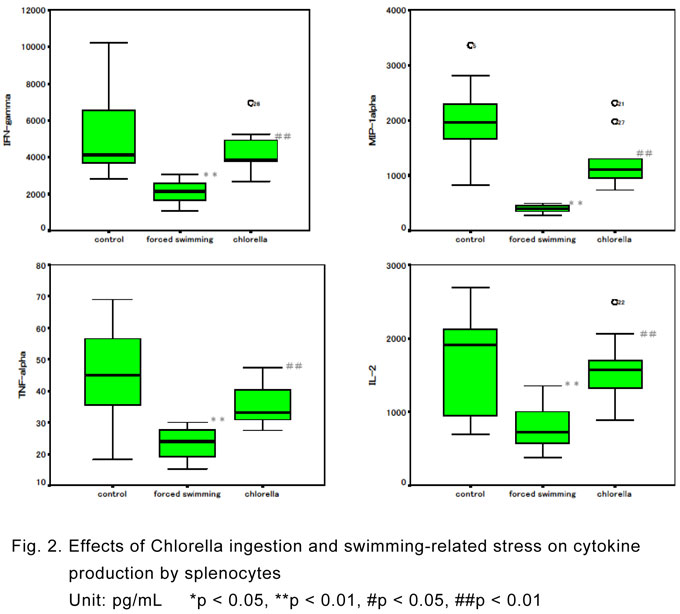- TOP
- List of reports
- Confirming the Anti-Fatigue and Immunomodulating Effects of Chlorella
Confirming the Anti-Fatigue and Immunomodulating Effects of Chlorella
【Scientific information】
Research and Development Department, Sun Chlorella Corporation
Confirming the Anti-Fatigue and Immunomodulating Effects of Chlorella
Presented at the 4th Scientific Meeting of the Japanese Association for Food Immunology (2008)
It is known that stress can disturb the balance in immune function and is thus
associated with the onset of allergy. Chlorella is a health promoting food with
a long history of use. It has been reported to be useful in the control of
hyperlipidemia, hypertension, and diabetes mellitus. To date, however, no
report has been published concerning the efficacy of Chlorella against
stress-caused changes in immune function. We recently evaluated the effects
of Chlorella in mice exposed to stress induced by forced swimming and
confirmed the anti-fatigue and immunomodulating effects of Chlorella.
The
results of this study are presented below.
- Study Objectives
- The study was undertaken to confirm the anti-fatigue and immunomodulating effects of Chlorella in mice exposed to exercise-related stress.
- Method of experiments
- Mice were divided into three groups: a control group (mice fed a basic diet without being forced to swim), an untreated swimming group (mice fed a basic diet and forced to swim), and a Chlorella-treated group (mice fed a diet containing 0.5% Chlorella and forced to swim). Each of the mice assigned to the untreated swimming group and the Chlorella-treated group was forced to continue swimming until total exhaustion on Days 0, 4, 7, 10, and 14 of the study. The duration of swimming on each of these days was measured. Immediately after completion of forced swimming on Day 14, the spleen was isolated from each mouse, and splenocytes were incubated in the presence of Concanavalin A for 48 hours. The supernatant was checked for levels of 22 cytokines using a Multiplex Bead Array.
- Results
- (1) Effects on duration of swimming (Fig. 1)
- The duration of swimming on the last day of the study in the Chlorella-treated group was about twice as long as that in the untreated swimming group. This result suggests that ingestion of Chlorella allows more efficient energy utilization, with manifestation of anti-fatigue effects.
- (2) Cytokine levels in supernatant from splenocyte cultures (Fig. 2)
- Compared to the control group, the untreated swimming group exhibited significant
reduction in levels of IFN-, MIP-1, GMCSF, RANTES, IP-10, IL-2, IL-6, IL-13, IL-17,
and TNF- and significant elevation of levels of IL-4, Il-7, IL-10, and IL-15.
Compared to the untreated swimming group, the Chlorella-treated group exhibited significant elevation in levels of IFN-, MIP-1, GMCSF, IP-10, IL-2 and TNF- and little difference in levels of IL-4, IL-7, IL-10, and IL-15.
IFN-/IL-4 ratio, an indicator of Th1/Th2 balance, was significantly lower in the untreated swimming group than in the control group, while it was significantly higher in the Chlorella-treated group than in the untreated swimming group. - These findings confirmed that although the stress associated with forced swimming reduced secretion of Th1-associated cytokines (IFN-, IL-2, etc.) and granulocyte stimulation factors (MIP-1, GMCSF, IP-10, etc.), ingestion of Chlorella suppresses the reduction of their secretion and change in Th1/Th2 balance.
- Taken together, these findings suggest that Chlorella exerts anti-fatigue and immunomodulating effects in mice exposed to the stress induced by forced swimming.


Presentation at a scientific meeting
- Name of Meeting:
- Japanese Association for Food Immunology – The 4th Scientific Meeting
- Title:
- Immunomodulating effects of Chlorella on stress induced by forced swimming
- Presenters:
- T. Mizoguchi1, Y. Arakawa1, M. Fujishima1, T. Saito2, M. Kishinami2, and T. Masuzawa2
- Affiliation:
- 1) Sun Chlorella Corp. 2) New Drug Development Research Center, Inc.





